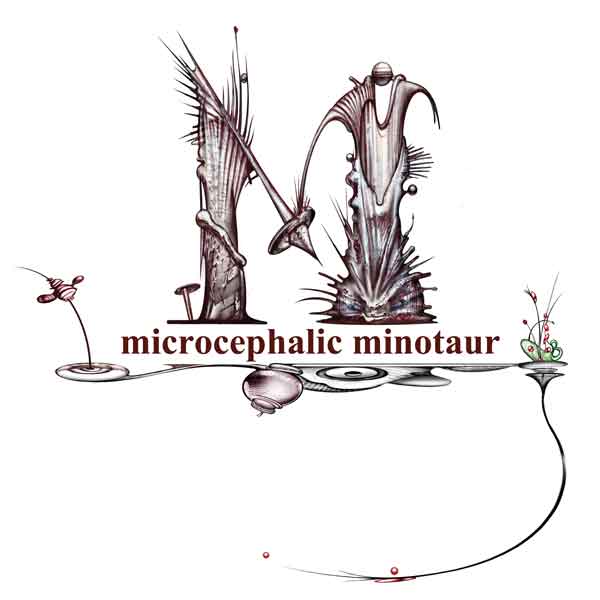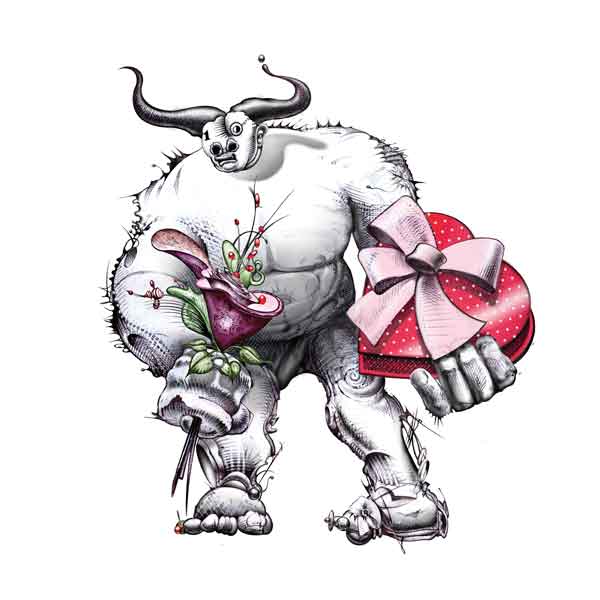SMALL HEADS AND BIG HEARTS
by Ted Crawford

Microcephalic l /mahy-croh-suh-fal-ik/ adj. Abnormally small-headed.
Minotaur l /min-uh-tawr/ n. Bullheaded monster in the Cretan Labyrinth.

*Quodlibetical Moments
Warren l n. A series of underground tunnels
where rabbits live, a building or place with
many connected rooms, passages, etc.,
where you can get lost very easily.
Unusual I am in many ways, including the nature of my clientele and the speed of my therapies. If I take more than one session for a cure, I consider myself to have failed and refund double the fee to the client.
As the minute hand on the grandfather clock between the bookcases trembled from 9:59 toward the inevitable new beginning of 10, I turned on my favorite radio station—NPR. Synchronicity is ever at the heart of my cures, and how many times has the radio spoken some wisdom that made a client lift his or her head and take a new lease on life? The office filled with the mellifluous voice of Aura Aurochs, the guest host of “All Things Quodlibetical”, my favorite show among the many beloved NPR offering.
As the minute hand pointed to the perpendicular, I heard a knock that sounded like a battering ram brought with ever such gentle restraint into contact with my door. What anticipation I feel for the moment of first meeting! The eyes take in truths that the mind may never grasp. Sweeping open the door, I saw a tiny, bullish head with enormous dark horns perched atop his massive body.
His dark eyes radiated a pain that I felt like my own, yet those same eyes spoke to me of unfulfilled potentials. Undoubtedly, he could be a 10 if only given a little encouragement. I could hardly believe that in each huge hand he held a gift for me—a plant with red berries and a huge, heart-shaped, red polka-dotted box of chocolates bound in a lavish pink ribbon.
“Thank you so much,” I said, my arms overflowing with his gifts that I deposited on the coffee table in front of the couch. “Come in. Have a seat and make yourself comfortable.”
He barely managed to squeeze his haunches into the armchair facing mine.
“May I ask what brings you here today?”
“I am,” he answered with a throaty roar that might easily have expanded into a bellow of pain or anger, “a microcephalic minotaur.”
“Ah,” I nodded to show that I heard him, but I also heard Aura Aurochs saying on the radio that today’s show would be about the stock market and related matters. “You’d like to discuss that?” “What is there to discuss?” he mumbled miserably, “It’s a fact.” “Do you have strong feelings about being a microcephalic minotaur?” “It makes me profoundly unhappy.”
“Why?” I asked.
“Look at me,” he waved a hand from torso to head. “I’m neither one thing nor another.”
“You’re an amalgam, utterly new, not to be compared with other things.”
He buried his tiny head in the palms of his hands. I realized that each hand was certainly more than twice as large as his head. On the radio, Aura had introduced her guest, the famed economist Sir Hector Tome, who began to elaborate on the connection between cattle (of all things!) and the stock market.
“The very words ‘stock market’,” said Sir Hector, “suggest a place for the sale of livestock. So phrases like ‘taking a cut’ or ‘watered stock’ have the ring of a time when livestock served as a principal form of wealth.”
“Why are you unhappy?”
“I want to fit in, but I simply don’t. I don’t fit. The doorway,” he pointed, “is too small. This chair is too small.”
“This desire for conformity,” I responded, “do you recall the first time that you felt it?”
“I’ve always felt this way.”
“Ah, I see. Then it is buried deep in the history of your family. What can you tell me about that?”
He tilted his diminutive head to one side, so one horn pointed up and the other down.
“A long time ago something not very good happened.”
“What was that? What happened?”
“It’s a tawdry story,” he went on, “but a grandmother of mine countless generations ago fell in love with a bull and brought a child into the world. That child and his countless progeny down the millennia have been half bull and half-human. We live in a miserable warren* of tunnels underground and almost never see sunlight.”
“Bestiality is hardly the norm,” I observed calmly, “but certainly no reason for you to be unhappy today.”
“Then some mad scientist made a mockery of me with his art. Look at me,” he pointed to his head, “I am severely disproportioned.
“The word ‘chattel’,” observed Sir Hector on the radio, “which means a moveable piece of property, is closely related to the word ‘cattle’. Also, the word pecuniary, which means of or pertaining to money, comes from the word pecus, which is Latin for livestock.”
“Disproportioned? Mad scientist? Nonsense!” I responded strongly. “The other day I had a little boy come to me. He was upset that his feet were so large. And last week a woman came who insisted that her breasts were too small. Only enlargement would make her whole. Let me tell you that these externalities, these happenstances of appearance, are not what make us what we are!”
He straightened and looked quizzically at me. “But . . .”
“You brought me gifts,” I interrupted, tears rising suddenly in my eyes, “No other client has ever brought gifts to a first session. Your big torso is barely adequate to hold your huge heart. And that small head of yours is handsome to me, sincere, with a wondrous potential gleaming in your eyes.”
“I point out the prevalence of what I call ‘cattle think,” said Sir Hector on the radio, “because it is outmoded and damaging. We continue to breed and devour cattle when that consumption should be as antiquated as measuring wealth by the cow and bull. No less a source than the Food and Agricultural Organization of the United Nations says livestock production is one of the major causes of the world’s most pressing environmental problems. Those problems include global warming, land degradation, air and water pollution, and loss of biodiversity.”
My visitor listened now to the voice coming from the radio.
“There’s work to be done,” I said. He sat still, lost in meditation.
“Yes,” he finally responded.
“Yes?” He nodded his head.
“How do you feel?” I asked.
He hesitated for a moment.
“Better.”
I realized that his issue had not been his appearance at all. It had been his pent-up energy, a desire to do good that lacked direction until he heard Sir Hector’s trenchant words.
“You didn’t tell me your name.”
“Asterion.”
“A handsome name,” rejoined. “What does it mean?
Slowly, a smile spread over his face.
“Of the stars.”
“ And well it should,” I said, seeing, at last, the light,
and the twinkling, shine in the microcephalic minotaur’s eyes.